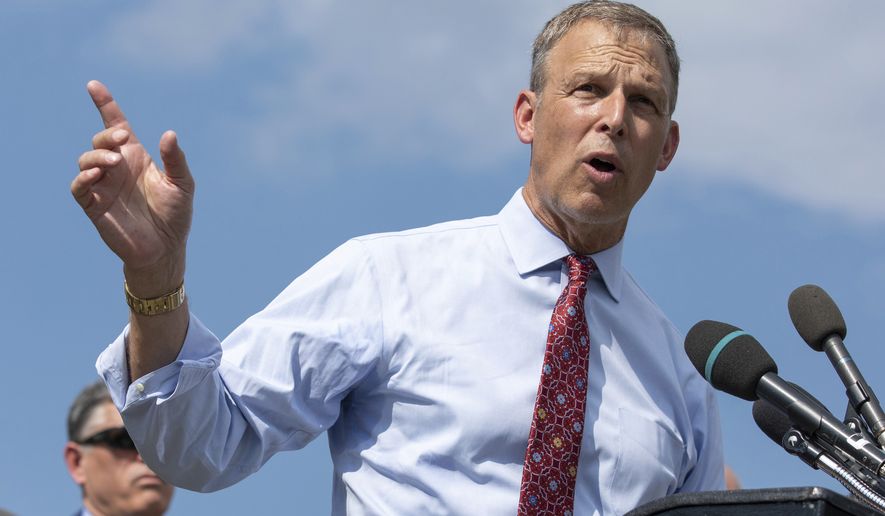Rep. Scott Perry, the new chairman of the conservative House Freedom Caucus, is pushing Republican leaders to gut federal agencies of what he says are partisan hacks who dominate middle management throughout Washington.
Mr. Perry called the housecleaning, including at federal law enforcement agencies, “a necessity.”
“Our beloved and respected, revered, trusted law enforcement agencies — including the FBI, including the Department of Justice and some of our intelligence agencies — are rotting from the top,” Mr. Perry told The Washington Times. “This is the American citizens’ government, not the permanent bureaucracy here in Washington, D.C. Sorry to be disrespectful to them. They’re not running the show.”
The permanent, liberal-leaning bureaucracy — what some call the “deep state” — has vexed conservatives for years, but the criticism came to a head during President Trump’s tenure in the White House.
“The American people are sick of it. They didn’t elect any of those people. And there’s no accountability left for any of those people. Congress can do a lot of things, but it has to have the will to do them,” the Pennsylvania Republican said.
Conservatives say Mr. Trump and his team were dogged by a Washington bureaucracy that was determined to stop him and his agenda.
Many Democrats say Mr. Trump and his allies deserve extra scrutiny for what they call abuses of power and lawlessness.
Mr. Perry’s viewpoint isn’t an outlier. Some in House Republican leadership share his concerns about the partisan bureaucracy.
Republican leaders on the House Judiciary and Oversight and Reform committees called for an investigation into the Centers for Disease Control and Prevention last year after emails showed the nation’s second-largest teachers union influenced the agency’s policies on reopening schools.
House Minority Whip Steve Scalise, Louisiana Republican, said oversight and accountability issues will be a top priority if Republicans win the majority in this year’s elections.
“We’ve talked a lot about the kind of oversight and transparency that does not exist right now,” he said in a recent interview with The Times. “A lot of agencies need scrutiny, and we’re going to be having a lot of internal conversations about the best way to clean up Washington. It’s a big array of areas of Washington that need to be cleaned up, and we’re having those internal conversations right now.”
It is not just federal law enforcement agencies that the Freedom Caucus has in its sights. Mr. Perry also wants a political scrub-down for agencies such as the CDC.
“You drive around this town [and see] huge buildings with literally thousands and thousands of people in there. I’ll just use the CDC, for instance,” he said. “Fifty-thousand employees, hundreds of billions of dollars, and there’s not one study right now that I know of to look at natural immunity regarding this pandemic. How is that possible? It’s possible because the bureaucracy doesn’t want to look at it.”
Conservative leaders say the partisanship and power of Washington’s unelected bureaucrats came into sharp focus during the Trump years.
From the beginning of his 2016 campaign, throughout his time in office and after he left the White House, Mr. Trump and his allies have been under investigation by an array of federal agencies, including the FBI, the IRS, the Federal Election Commission and the Securities and Exchange Commission. The most prominent, launched by the Justice Department in 2017, was special counsel Robert Mueller’s investigation into Trump-Russia collusion to influence the 2016 election, which ultimately failed to substantiate the accusations against Mr. Trump.
The Mueller probe led to the prosecution and conviction of Trump campaign chairman Paul Manafort, who served two years in prison for tax evasion and bank fraud. Longtime Trump confidant Roger Stone was convicted of impeding a congressional inquiry and was sentenced to more than three years in prison. Mr. Trump pardoned both men before he left office.
Trump campaign attorney Michael Cohen, who, when targeted by investigators turned against the former president, was convicted of tax fraud, campaign finance violations and perjury during congressional testimony. He served three years in prison.
Mr. Trump also issued a pardon to his former national security adviser, Michael Flynn, who pleaded guilty to lying to the FBI about his conversations with a Russian diplomat. Mr. Stone also attempted to reverse his plea after evidence surfaced about the bureau’s questionable tactics in interviewing Mr. Flynn.
Mr. Perry said Republican lawmakers are drawing up accountability measures that go beyond a made-for-TV scolding of agency heads at congressional hearings.
“The bureaucracy feels like it’s in charge, and it’s not supposed to be,” he said.
• Kerry Picket can be reached at kpicket@washingtontimes.com.




Please read our comment policy before commenting.